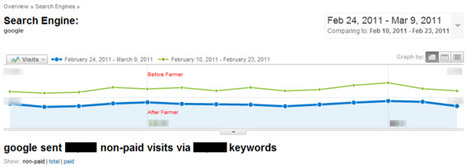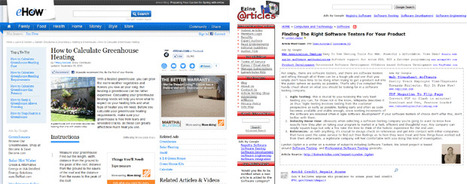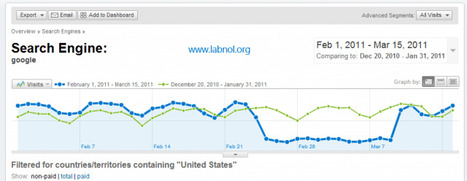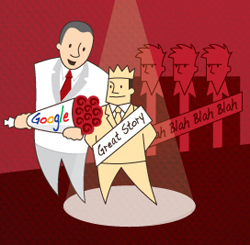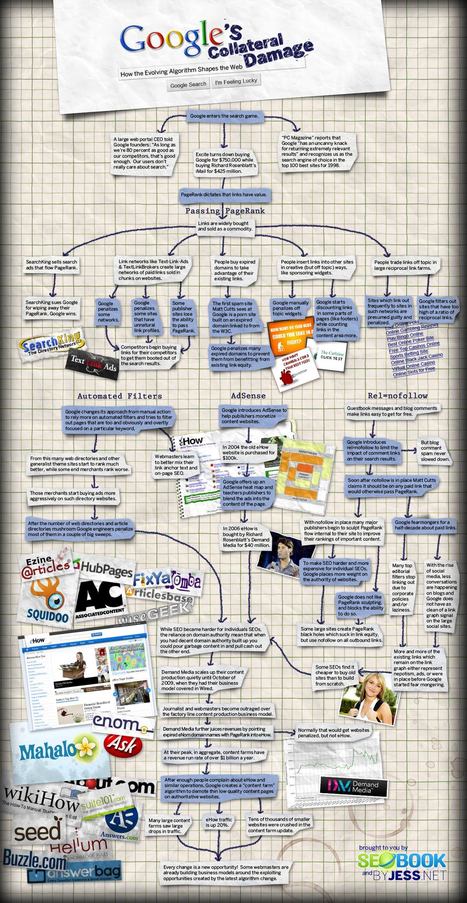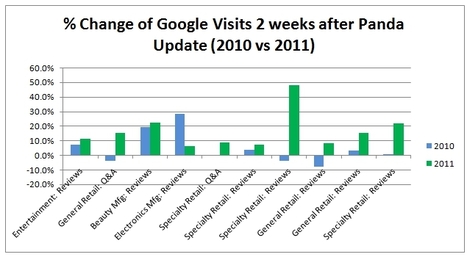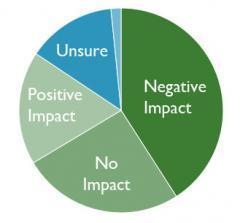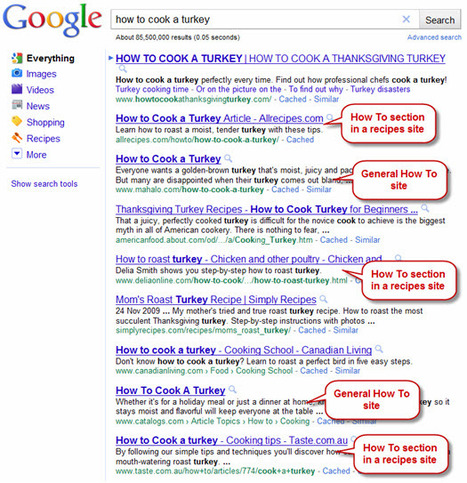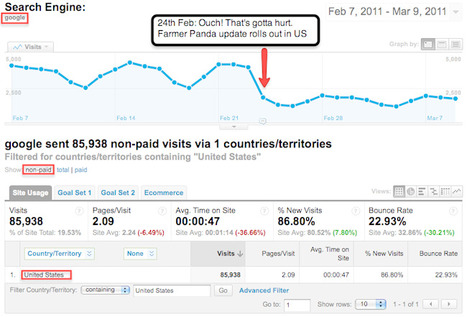 Your new post is loading...
 Your new post is loading...

|
Scooped by
Robin Good
|
Analysis of the effects of the Google Farmer Update
Given that nearly 12% of search results were affected by this update, many industry experts have chimed in with analysis of winners and losers in the aftermath of this Google Farmer Update:

|
Scooped by
Robin Good
|
If all your global sites have low quality links, duplicate content, and are on a subdirectory, then Google's Panda update will likely cause you problems. But don't give up and throw in the towel. You can still get your act together.
This article will give you some insight on some things you can do to mitigate any risk you might be facing and provide some ideas on how to improve your global pages now that up to 20 percent of your competitors may have disappeared.

|
Scooped by
Robin Good
|
The organic traffic to my website dropped after Google Panda (Farmer) update went live in the US. Two weeks later and after cleaning up the site a bit, the traffic from Google to my site is picking up.

|
Scooped by
Robin Good
|
In an effort to increase the quality of its search results, Google launched an update in late February dubbed the “Farmer/Panda Update” by the search-engine-optimization industry. The update affected 12 percent of Google’s results, decreasing organic traffic for sites like the one owned by Luis Hernandez, Jr. He is CEO of The Motor Bookstore, a DeBary, Fla.-based retailer of automotive repair, restoration and service manuals.

|
Scooped by
Robin Good
|
A while back, I wrote about how to get the best high volume links. Fast forward eight months and Google has made two major changes to its algorithm -- first to target spammy/scraper sites, followed by the larger Panda update that targeted "low quality" sites. Plus, Google penalized JCPenney, Forbes, and Overstock.com for "shady" linking practices.
What's it all mean for link builders? Well, it's time we say goodbye to low quality link building altogether.

|
Scooped by
Robin Good
|
Many Webmasters and site owners are suffering with the Google Farmer / Panda update in the Google.com, Google U.S., results. But soon, the Farmer/Panda update will be rolling out more widely beyond the U.S. to the U.K. and other countries.
But how soon?
Well, it was expected to have happened already. I'd be surprised if it did not happen this week. But at the same time, I'd be surprised if it did roll out more without the U.S. version getting updated.

|
Scooped by
Robin Good
|
It seemed that sites whose pages had fewer and/or less intrusive blocks of advertisements on them tended to be in the winner bucket, while those with more and more intrusive advertising tended to be in the loser group.
Likewise, sites whose UI/design would likely be described as more modern, high quality, thoughtful and "attractive" were winners vs. the "ugly" sites that tended to be in the loser bucket.
When it came to user-generated-content (UGC) sites, those that tended to attract "thin" contributions (think EzineArticles, Hubpages or Buzzle) lost, while those with richer, often more authentic, non-paid, and not-intended to build SEO value or links (think Etsy, DailyMotion, LinkedIn, Facebook) won.
In the "rich content" sector, pages with less usable/readable/easily-consumable content (think AllBusiness, FindArticles) tended to lose out to similarly content-rich sites that had made their work more usable (think LOC.gov, HuffingtonPost)

|
Scooped by
Robin Good
|
The Google Farmer/Panda update hit and 40% said they were impacted by the update.
We documented advice on how to fix the issue, if you were one of the sites impacted by this update. But specifically, what do you do with the low quality content?
Do you 404 the pages so they are gone forever? Do you 301 redirect those pages to higher quality content pages? Do you noindex the pages? The answer is it depends.

|
Scooped by
Robin Good
|
Mark’s down at SMX San Jose this week, rubbing elbows with some of the SEO industry’s top authorities, and the most-discussed topic or theme is easily the recent Google algorithm update. Most of the industry has taken to calling it the “Farmer Update,” a nod to the so-called “content farms” that were supposedly the target, but Google wants us to start referring to it as the Panda update (because who can be angry at a cuddly panda bear?)
Vanessa Fox over at Search Engine Land has a great rundown of some of the predominant logic among conference attendees. And as these industry veterans socialize and discuss search together, some fairly universal conclusions are begin drawn regarding the Panda Farmer Update. Aaron Wall also has a great write-up today with his own usual good insights.
©2008-2011 ReelSEO: What SEO Experts Advise For Those Penalized By Google's Farmer Update
Reproduction without permission is prohibited. All Rights Reserved.

|
Scooped by
Robin Good
|
I feel like I have talked and written about the Google Farmer/Panda update way too much, but the truth is, about 40% of you were impacted by this update in a bad bad way and even though you are making changes none of you are really seeing any improvement in your rankings.
I have been monitoring the forums on a daily basis, looking for anyone claiming to have been rescued from the Farmer/Panda update. So far, not one person in the forums I track claimed they are back to seeing the same levels of traffic.
Only two publishers that I know of claimed they are back after being hit by Google's update. One is Cult Of Mac and the other is Digital Inspiration. Google's Matt Cutts specifically said Cult Of Mac was not impacted by the Farmer / Panda update because if they were, they would still not be ranking. So whatever hit Cult Of Mac, it was not this update and they are back in Google for other reasons.

|
Scooped by
Robin Good
|
It has been a little over two weeks since “hell broke loose” with Google’s Farmer/Panda algorithm update. Some sites that had been relying heavily on organic traffic saw that traffic plummet, while others gained.
The changes impacted roughly 12 percent of US search results according to Google.
The Online Publishers Association estimated that the changes would impact approximately $1 billion in revenue.
There’s been considerable discussion, debate and suggestions for what to do since Panda appeared (see related entries below). The purpose of Panda (Google’s internal name) was to attack two categories of sites that Google saw polluting search results with spam or “low quality” content.
Immediately before Panda was unleashed, Google explained its objective in a January 21 blog post:
We’re evaluating multiple changes that should help drive spam levels even lower, including one change that primarily affects sites that copy others’ content and sites with low levels of original content. We’ll continue to explore ways to reduce spam, including new ways for users to give more explicit feedback about spammy and low-quality sites.
As “pure webspam” has decreased over time, attention has shifted instead to “content farms,” which are sites with shallow or low-quality content.

|
Scooped by
Robin Good
|
With the latest changes to its search algorithm, Google goes after websites that specialize in junk content.
What's the Point? Google wants to drive users to high-quality sites while devaluing low quality sites.
Search engine optimization may not have the gravity of toppling governments or the can't-look-away appeal of the Charlie Sheen circus, but the field has been making news lately.
First, there was the highly-publicized backlash against JCPenny.com over the retailer's aggressive SEO tactics, which included the use of link farms. This was followed shortly thereafter by Google's official release of a significant update to its search results ranking algorithm, dubbed informally as the "Farmer Update" (for its clear focus on devaluing "content farms").

|
Scooped by
Robin Good
|
Ok, so for the sake of all who have been hit by the so-called "Farmer" update, I thought it might be useful to document my own attempt to increase my website's "Quality" measurement (whatever that means,) in an attempt to gain back some of my previous good ranking in the SERPS.
My site is rather small compared to many mentioned on these boards –– just 700 or so pages –– and at it's peak it has never made me more than $1,000 in any month period, but in this economy that lost $1,000 is kicking my butt.
|

|
Scooped by
Robin Good
|
t few days. I’m not quite certain how it works, but I’ve mined a significant amount of SERP data and things have definitely been shaken up.
To analyze the effects of the update, I first mined a large set of data based on SERPs from both google.com and google.ca. Because the update has been implemented in the USA and not Canada, we can compare these two sources and look for discrepancies in ranking. It’s not perfect, but any significant difference can give us a clue as to what is going on.

|
Scooped by
Robin Good
|
Two weeks ago, Google rolled out changes to its algorithm in an attempt to decrease visibility and rankings of low quality sites on 11.8% of search queries, called the Panda Update. “Low quality” is defined on search engine blogs as content that is shallow or limited, poorly written, copied, and generally not useful to users.
I don’t know about the rest of you, but whenever a big Google update rolls out, I’m back in elementary school gingerly turning in a pop quiz – I think that I’ve paid attention in class, but in that moment, all I can do is lace my fingers behind my back and wait patiently for the teacher to grade my work.
In addition to the SEO benefits of fresh user-generated content (UGC) on product pages, we have seen time and time again that UGC aggregated into branded archive-like pages can attract a substantial amount of ridiculous long tail keyword traffic. As the Panda Update was announced, we knew that UGC Archive sites would be affected in some way. With a bit of cautious uncertainty in mind, we randomly selected a group of archive sites and started monitoring.

|
Scooped by
Robin Good
|
It's official, what was suggested websites and the people that own them take seriously back in February 2010 has become a reality in February 2011. The latest algorithm update, officially referred to as Google Panda, has impacted sites that apparently were not practicing Google Caffeine based SEO Internet Marketing much in the same way Google Mayday took eCommerce sites by storm last year. So without further hesitation let's review some on site, and a couple off site, Internet Marketing tips that will help sites; whether business to business or business to consumer, regain good standing in Google search results- SERP's.
Each of these techniques, backed by thorough research through my company- Irbtrax "Real Time" SEO Internet Marketing, are firmly fixed in organic methods and have generated visible Caffeine related results when effectively applied. Because whether you're talking about Google Mayday, or Google Panda, they are simply extensions of the Google Caffeine algorithm and infrastructure update that started integrating in early 2010.
For the purpose of conveying information I've arranged the search result goals of Google Caffeine into the following five categories:
- Accuracy: Search results that match the information you're looking for.
- Relevancy: Ensuring SERP's return results that are up to date and useful.
- Efficiency: Faster results and the ability to custom select search options.
- Authority: Search results that educate users and provide enhanced resources.
- Sufficiency: Offering a wider range of results by including different platforms like Social Media, video and real time features.

|
Scooped by
Robin Good
|
Google has finally rewarded those steadfast providers of valuable, high-quality content over purveyors of drek. In the main objective of their recent search algorithm revamp codenamed Farmer, Google has yanked republishers, editorial mills, aggregators, and other wholesale sources of otherwise weak, unorganized content (such as Associated Content and Mahalo, to name two of the most egregious offenders) off their high-ranking perches and slashed their search results by adhering to a new system that attempts to account for actual editorial quality. Adhering to a standard of perceived quality means that news outlets, brands and other publishers of notably engaging stories are finally gaining the additional recognition they deserve. But what of the grey area—the in-between web listings that don’t deserve to be demoted? Will those harmless do-gooders potentially be misplaced, orphaned by Google’s iron hammer? One thing’s for sure: Great content wins—especially when a system exists to recognize it as such.

|
Scooped by
Robin Good
|

|
Scooped by
Robin Good
|
Two weeks ago, Google rolled out changes to its algorithm in an attempt to decrease visibility and rankings of low quality sites on 11.8% of search queries, called the Panda Update. “Low quality” is defined on search engine blogs as content that is shallow or limited, poorly written, copied, and generally not useful to users.
I don’t know about the rest of you, but whenever a big Google update rolls out, I’m back in elementary school gingerly turning in a pop quiz – I think that I’ve paid attention in class, but in that moment, all I can do is lace my fingers behind my back and wait patiently for the teacher to grade my work.

|
Scooped by
Robin Good
|
On February 24th, the Google Farmer Update touched down and it changed 12% of Google's search results. Sounds big, doesn't it? But how many of the readers here, a good sampling of SEOs, did it impact overall?
I ran a poll about five days after Farmer/Panda was rolled out asking how did this update impact you. We had 313 responses to date, which isn't a bad sampling size. Of course, you have to consider those who were impacted are more likely to respond, but anyway, let me share the results with you.
40% said Less Google Traffic (Negative Impact) (128)
25% said Same Google Traffic (No Impact) (80)
18% said More Google Traffic (Positive Impact) (56)
14% said Don't Know Yet (44)
1.6% said an Other answer... (5)

|
Scooped by
Robin Good
|
A lot of SEO predictions for 2011 were published in the end of 2010, while not many marketers mentioned the increasing popularity of Q&A sites. I think that it could be a great opportunity to exploit this new rising phenomenon for our marketing efforts while it's still fresh.
Why shouldn't you worry about Google's Content farm update?...

|
Scooped by
Robin Good
|
As of 24th Feb 2011, a major update by Google on how it ranks sites has affected 12% of search results and halved many sites’ visitor numbers. Named the Farmer or Panda Update it’s only affecting US Google results as I write but if you’re outside the US it is coming to you soon. Here’s how to find out if you have already been hit, are going to be and what to do about it.
Can your business handle a 50% drop in organic (non-paid) visits from Google? That’s what might be coming your way courtesy of Google’s Panda algorithm update.
Before we get into the whys and wherefores, find out if you’ve been hit by Panda …

|
Scooped by
Robin Good
|
Beyond Panda
On Feb. 24, Google announced that the Panda update, which was an entirely new algorithm, had been released into the wild. Since then, we've chronicled which sites were hit the hardest, which sites became collateral damage, and Google's attempt at accepting feedback on the algorithm change. We also looked at why sites were dropped, future link building strategies, Google's advice to remove low-quality content, and some global strategies.
But the "dance" isn't over yet.

|
Scooped by
Robin Good
|
We had a conversation recently with HubPages CEO Paul Edmondson about the Google Panda update and its affects no HubPages, as it was often reported to be one of the hardest-hit sites from the update.
Edmondson had said in a recent blog post that they hadn’t seen it consistently drive traffic to better-quality Hubs. “On one hand, some of our best content has seen a drop in traffic; simultaneously, we have seen traffic rise on Hubs that are just as great,” he wrote. “We are taking this seriously — behind the scenes, we have been crunching data and focusing on making sure that we are doing everything right from our side. We have an editorial policy and internal system that rewards original useful content, and this aligns with what Google wants, too.”

|
Scooped by
Robin Good
|
Google’s Own Words About the Farmer/Panda Update
Google’s Matt Cutts said that while the change isn’t 100% perfect, searcher feedback has been overwhelmingly positive. He noted that the change is completely algorithmic with no manual exceptions.
Blocking “Low Quality” Content
Matt reiterated that enough low quality content on a site could reduce rankings for that site as a whole. Improving the quality of the pages or removing the pages altogether are typically good ways to fix that problem, but a few scenarios need a different solution.
|



 Your new post is loading...
Your new post is loading...





